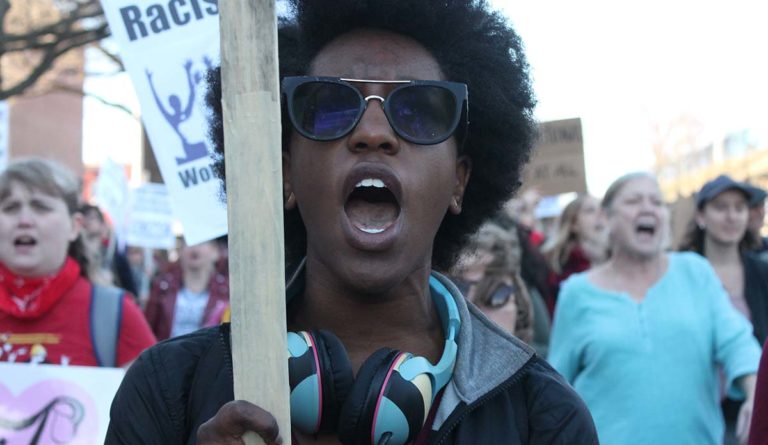Reproductive Health Care Requires Reproductive Justice
How does research shed light on inequalities in reproductive care, and influence mainstream feminist discourse?

Read Time: 5 minutes
Published:
Public health researcher Nancy Krieger acknowledged in a 1990 commencement address to UC Berkeley’s School of Public health that public health is inherently part of public welfare with roots in social justice. As we address health disparities, we address social inequalities. Access to reproductive care, namely abortion and contraceptives, is a hot political topic. In fact, hundreds of thousands came out to march on January 21, 2017 in the United States and around the world for the Women’s March. On March 8, 2017, women organized a “day without women” inspired by a “day without immigrants.”
In response to current dominant feminist discourse, women of color highlight the shortcomings of largely white, middle class, mainstream feminism that neglects intersectionality and excludes women of color, immigrant women, working class women, and gender-nonconforming women. However, this exclusion in mainstream feminism is not a recent phenomenon. While many white feminists are expressing concerns about their own reproductive care, including access to birth control and abortion, others have remained silent on issues regarding racial bias in reproductive access, exploitation of women of color in reproductive medicine including the development of the birth control pill through eugenicist testing practices, and within medical advances in general.
Given public health’s link to social justice, reproductive health care requires reproductive justice. The term “reproductive justice” was coined by black feminists in 1994; It not only includes a woman’s right to choose when and whether to have children, but also the right to raise any children we do have with dignity in a safe, healthy, and supportive environment. Therefore, we must ask: how does our research shed light on inequalities in reproductive care among marginalized women and influence mainstream feminist discourse in our efforts to address health disparities and social inequality?
Black feminists have pointed out that advocating for reproductive justice does not stop at abortion rights, contraceptive access, or even the labor and delivery process. It also includes dismantling health and social inequalities throughout the life cycle.
In my own research as a medical anthropologist, I have heard immigrant women of color voice frustrations regarding their reproductive care. For example, circumcised Somali women, with whom I do community-engaged research, report significant obstacles to culturally appropriate reproductive and preventative gynecological health services in the U.S. The lack of appropriate reproductive health care for Somali women largely reflects American doctors’ unfamiliarity and inexperience with female circumcision, and hints at ethnocentric biases within western reproductive medicine. To compound these barriers further, Somali women face discrimination due to skin color, religious identification, and perceived immigration status—beyond healthcare, and within it.
Lack of access to health services, culturally component care, and proper gynecologic instruments may deter Somali women from seeking or receiving routine preventative gynecological screenings. Similarly, doctors’ unawareness of Somali expectations and priorities for labor and delivery adds yet another obstacle for accessing reproductive health services. Current literature shows that infibulated Somali women are often encouraged to deliver via Cesarean section without a compelling clinical reason. Yet, some Somali women report fear or disinterest in delivering via (unnecessary) Cesarean.
Somali women represent one group, of many, who experience discrimination and injustice in healthcare settings in the United Sttes. Boundaries of care for marginalized women illuminate the necessity for reproductive justice within public health discourse as we address reproductive care that goes beyond access to abortion and contraception. That is not to say that women do not need access to safe abortion or contraception—we certainly do, particularly for those who are disproportionally affected by policy restrictions for abortion. However, Somali women’s experiences reflect larger concerns over the divide between reproductive health care and reproductive justice.
Black feminists have pointed out that advocating for reproductive justice does not stop at abortion rights, contraceptive access, or even the labor and delivery process. It also includes dismantling health and social inequalities throughout the life cycle. Yet, we often explore the links between discrimination and health, at the individual or population level, comfortably removed from social justice, feminist, or reproductive justice frameworks.
It is essential to reflect on how mainstream feminism silences marginalized women, including immigrants, Muslim women, and other less-visible, non-dominant groups at greater risk for ethnocentric messaging in public health campaigns. As public health workers, when we focus on reproductive health care, we address larger social inequalities. Therefore, to reduce reproductive health disparities we must move toward supporting equality throughout the entire reproductive life cycle by critiquing structural and social systems that perpetuate conditions in which these disparities thrive, including within the mainstream feminist movement.
The author wishes to acknowledge the contributions to this article by Bayla Ostrach, PhD formerly of Boston University School of Medicine, Medical Anthropology and Cross Cultural Practice.
Feature image: Elvert Barnes Photography, WOMEN UNITE TO FIGHT BACK International Women’s Day MARCH TO THE WOMEN’S JAIL on Greenmount Avenue in Baltimore MD on Wednesday afternoon, 8 March 2017.



